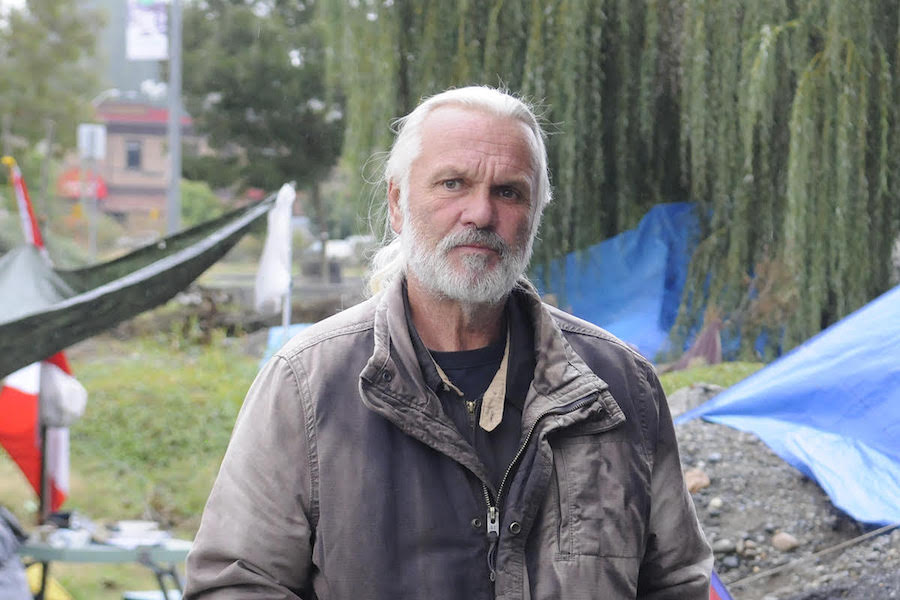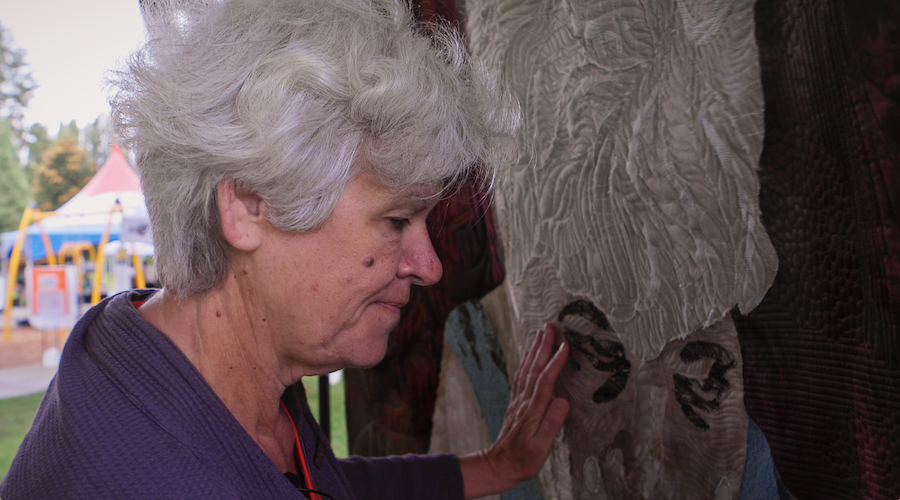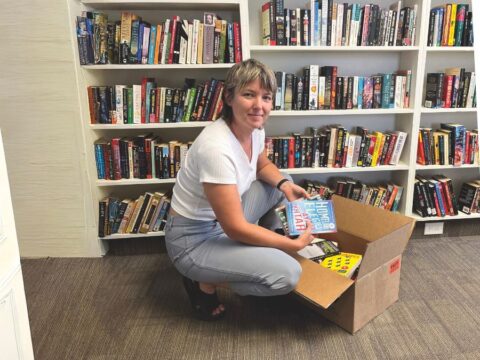Grief takes many shapes, but for lifelong quilter Marilyn Farquhar, grief took on texture and colours. In January 2020, the RCMP killed her brother, Barry Shantz, outside his Lytton, B.C. home during a mental health crisis. In the aftermath, Farquhar stitched her pain into a series of elaborate quilts: a self-portrait with her head in her hands, a portrait of her brother in the depths of despair and a soaring eagle to represent the release of his spirit. She called the project Kairos, a Greek word that translates to “an opportune time for action.”
A Bullet Pulling Thread, a new documentary by Toronto-based filmmaker Ian Daffern, follows Farquhar’s grief journey as she embarks on a cross-country trip. The end destination? To display her quilts in a B.C. park across from where Shantz, a homelessness advocate, once organized protests. In parallel, the film tells the story of Shantz’s life and death, exploring the questions of justice and accountability that have abounded in the aftermath of his shooting. Why wasn’t a mental health professional present? Were the RCMP officers’ actions justifiable, as an independent investigation would conclude in October 2020? How many people are touched when police violence ends a life?
You may unsubscribe from any of our newsletters at any time.
The documentary’s Toronto premiere is at the Hot Docs Ted Rogers Cinema on Dec. 7 at 6:30 p.m., as part of the JAYU Human Rights Film Festival. Jadine Ngan spoke to Daffern about the role art plays in exploring grief and justice.
Jadine Ngan: What first drew you to tell Marilyn and Barry’s story?
Ian Daffern: When I was making a film called Stitched Glass, the owner of the audio house I was working with told me, “My cousin has a story that might be interesting for a documentary. You might want to talk to her.” That cousin was Marilyn.
I spoke to Marilyn on a Zoom call in early 2021. Her brother had died about a year before that, and she was devastated. She couldn’t get out of bed for a long time, but she had a good friend who motivated her to deal with her grief through her art. She started the Kairos project in the summer, and when I met her, she had almost completed it. The pain was still so fresh for her, yet she was able to articulate it in such an interesting way. I knew that there was a story worth telling.
More on Broadview:
- I survived my suicide attempt 10 years ago. Here’s what I wish I could tell my younger self.
- Sufjan Stevens’ latest album, Javelin, is a soulful ode to queer romance, faith and grief
- Mourning my granddaughter’s death meant facing my anger
JN: Why was it important for you to not depict Barry as a perfect, completely innocent victim?
ID:I wanted to create a well-rounded portrait of a family member who had been affected by violence, and a well-rounded portrait of the person who was killed. Barry was already a fascinating figure in British Columbia. He’d gone from being an international drug smuggler to a prisoner to a crusader for the rights of the homeless. We portrayed him as someone who was complex and who had made big mistakes—but still didn’t deserve to be shot by the police.

JN: Did sitting with Marilyn through her struggle change the way you approach grief?
ID: It did. Marilyn lost the three most important men in her life within four months. Her father died of cancer. Her husband died, also of cancer. She had been their caregiver and knew they were going to die. Then suddenly, her brother was killed. She’d been living in a state of grief for so long, and to have him ripped away from her so suddenly was a shock. In her quilts, she expresses the feeling and experience of grief in a way words can’t. In one of the scenes at the end of the film, when she shows the quilts in person to people, everybody opens up to her and tells her their story.
My mother is very sick right now, and it’s been a real challenge for our family. Being able to talk to someone like Marilyn about the grief you can feel for someone even though they’re not gone from your life yet—it’s really been valuable. She has incredible empathy.
In your director’s statement, you wrote that “understanding the issues tackled by Marilyn and Barry is crucial to living in the world today.” What did you mean by that?
This film is a quilt itself, a quilt of issues. It’s about police violence, it’s about mental health, it’s about homelessness. These issues affect some communities more than others—racialized communities are more profoundly affected by police violence—but they affect everyone.
I’m not a natural advocate, but as an artist, I want to explore things that are challenging. I’m hoping this film can spark conversation, maybe be a bridge of empathy. Maybe people can look at people experiencing homelessness or mental health crises with more sympathy—or when they happen to experience that, know that they’re not alone.
This interview has been edited for length and clarity.
A Bullet Pulling Thread is currently seeking to book private and educational screenings for both communities and organizations across Canada in 2024. For details please contact the filmmaker directly at ian@idfactory.ca
***
Jadine Ngan (@jadinengan) is a National Magazine Award-nominated journalist based in Toronto. She was one of Broadview’s summer interns in 2021.














